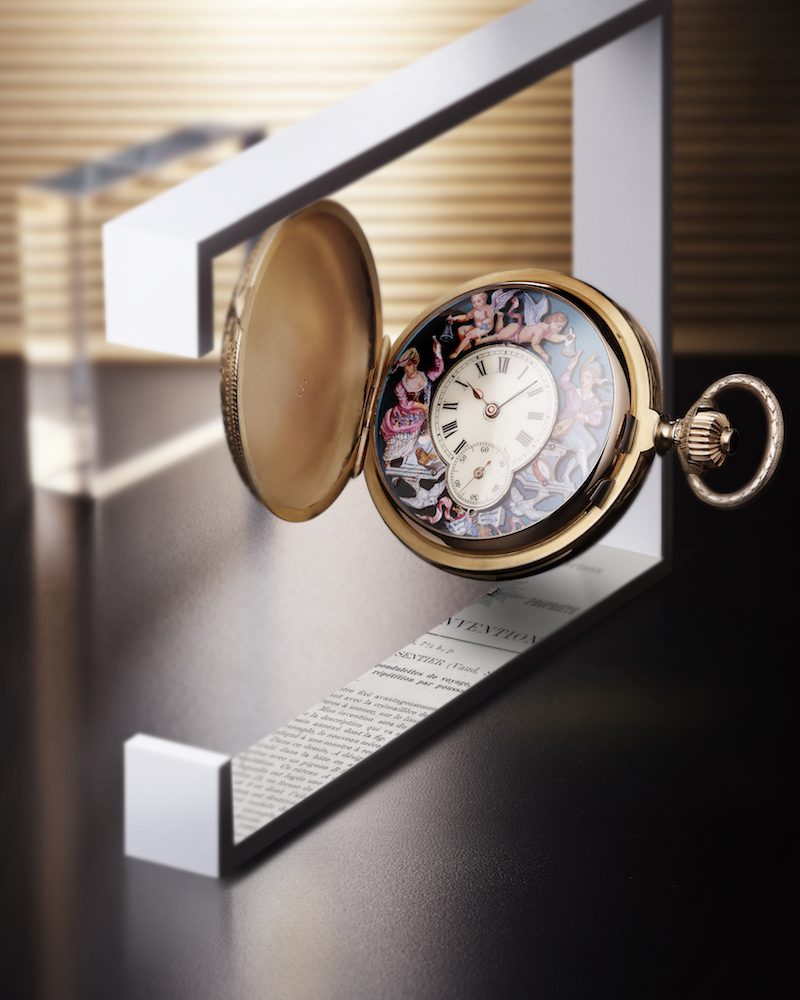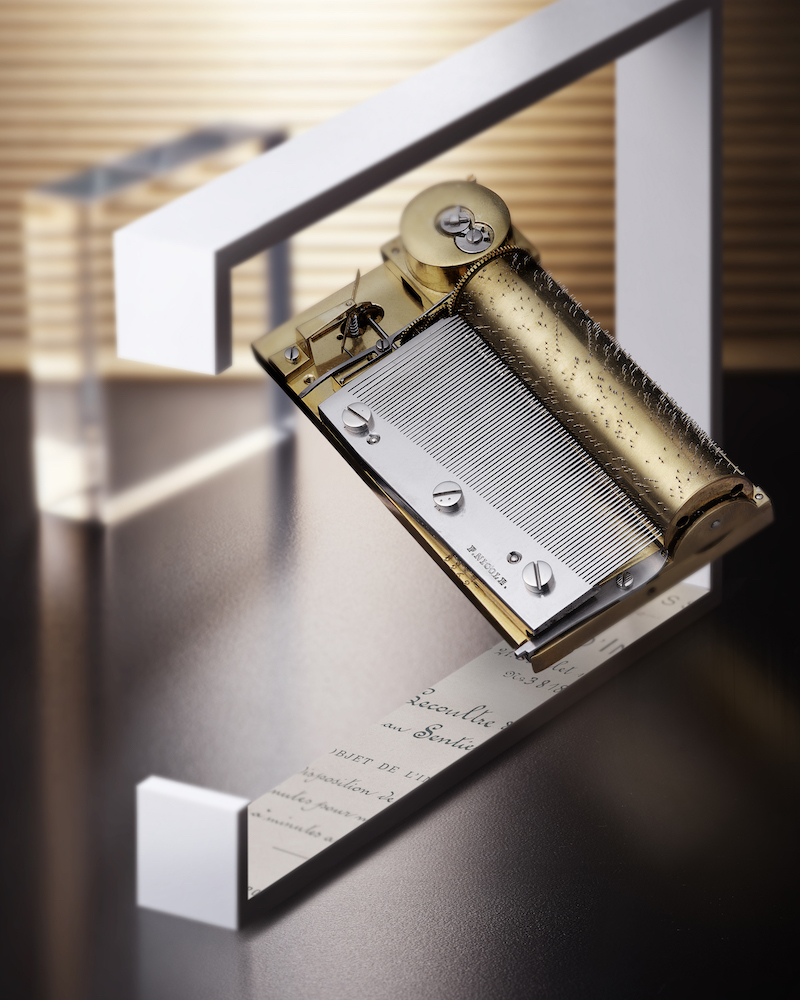Discover the sound of time with Jaeger-LeCoultre
Swiss heritage brand delves into its archives

A free daily email with the biggest news stories of the day – and the best features from TheWeek.com
You are now subscribed
Your newsletter sign-up was successful
Timekeeping and sound have long been linked – even if in our modern, digital age that nexus doesn’t quite, erm, chime. The word “clock” itself is derived from “cloche”, the old French world for “bell”, which has roots in “clocca”, Latin for the sound of a chime. In medieval Europe, those chimes – emanating from the town hall and turret clocks at the village church – divvied up daily life, and even when mechanical timepieces became more widespread, audible timekeeping was still relied on. “Prior to the invention of radium, which came into major use around World War I, it was the only way to tell the time at night,” says watch writer and historian James Dowling. Indeed, urban legend has it that minute repeater chiming watches - the ne plus ultra of complicated timepieces and plaything of the rich - came about as a sybaritic way to tell time in the dark.
That maniacal focus on precision, quality and, of course, developing ever-better measuring instruments for which to deliver such accuracy, eventually led to the establishment of Jaeger-LeCoultre the watchmaker. Founder Antoine LeCoultre was pretty obsessed with instruments himself: a decade after setting up shop, he invented the Millionometre, the first device to measure the micron to refine the manufacture of watch parts.
Unsurprisingly, Jaeger-LeCoultre’s unique roots in music boxes and watchmaking saw the minute repeater become something of a house speciality, and after debuting its first one in 1870, by 1900 the house had some 100 minute repeaters to its name (and more than 200 chiming watch calibres). Many were innovation firsts. There was the three-hammer minute repeater in 1880 that, instead of two hammers, now sounded a low note for the hours, a high note for the minutes and a three-note bell for quarters. “So instead of a ding, there’d be a ding-ding,” Belmont explains. “It was a much nicer melody.”
The Week
Escape your echo chamber. Get the facts behind the news, plus analysis from multiple perspectives.

Sign up for The Week's Free Newsletters
From our morning news briefing to a weekly Good News Newsletter, get the best of The Week delivered directly to your inbox.
From our morning news briefing to a weekly Good News Newsletter, get the best of The Week delivered directly to your inbox.

Post World War II saw life change radically, both socially and technologically – and Jaeger-LeCoultre played its part in 1950 with the debut of the Memovox alarm watch (a mashup of memo, for memory, and vox, voice). And while alarm timepieces were nothing new - Eterna had invented a wristwatch model in 1908, and even Jaeger-LeCoultre had made the first alarmed table clock a year later - the Memovox broke ground. “Before, watchmakers had added modules to existing watches to make the alarm, whereas the Memovox was designed from the start as an alarm watch,” says Dowling. Such innovation captured the imagination, making the Memovox a must-have item for businessmen on the move: it could wake you up, remind you of important meetings, even of your car-parking time to avoid fines and, in 1959, Jaeger-LeCoultre invented a diving watch that could ping underwater. “It was probably one of the world’s first smartwatches,” says Belmont. “It was a mechanical watch with a function that could be used for different purposes.”
The Memovox still resonates today – signature school-bell chime and all – and this year two new models have been added. The caseback is now transparent, allowing one to enjoy the chiming mechanism in all its glory – namely those 77 hammer strikes per second – while a new timer function enables setting of the alarm based on the number of hours due to elapse (versus based on a particular time). Resounding stuff.

A free daily email with the biggest news stories of the day – and the best features from TheWeek.com
-
 Local elections 2026: where are they and who is expected to win?
Local elections 2026: where are they and who is expected to win?The Explainer Labour is braced for heavy losses and U-turn on postponing some council elections hasn’t helped the party’s prospects
-
 6 of the world’s most accessible destinations
6 of the world’s most accessible destinationsThe Week Recommends Experience all of Berlin, Singapore and Sydney
-
 How the FCC’s ‘equal time’ rule works
How the FCC’s ‘equal time’ rule worksIn the Spotlight The law is at the heart of the Colbert-CBS conflict
-
 Friendship: 'bromance' comedy starring Paul Rudd and Tim Robinson
Friendship: 'bromance' comedy starring Paul Rudd and Tim RobinsonThe Week Recommends 'Lampooning and embracing' middle-aged male loneliness, this film is 'enjoyable and funny'
-
 The Count of Monte Cristo review: 'indecently spectacular' adaptation
The Count of Monte Cristo review: 'indecently spectacular' adaptationThe Week Recommends Dumas's classic 19th-century novel is once again given new life in this 'fast-moving' film
-
 Death of England: Closing Time review – 'bold, brash reflection on racism'
Death of England: Closing Time review – 'bold, brash reflection on racism'The Week Recommends The final part of this trilogy deftly explores rising political tensions across the country
-
 Sing Sing review: prison drama bursts with 'charm, energy and optimism'
Sing Sing review: prison drama bursts with 'charm, energy and optimism'The Week Recommends Colman Domingo plays a real-life prisoner in a performance likely to be an Oscars shoo-in
-
 Kaos review: comic retelling of Greek mythology starring Jeff Goldblum
Kaos review: comic retelling of Greek mythology starring Jeff GoldblumThe Week Recommends The new series captures audiences as it 'never takes itself too seriously'
-
 Blink Twice review: a 'stylish and savage' black comedy thriller
Blink Twice review: a 'stylish and savage' black comedy thrillerThe Week Recommends Channing Tatum and Naomi Ackie stun in this film on the hedonistic rich directed by Zoë Kravitz
-
 Shifters review: 'beautiful' new romantic comedy offers 'bittersweet tenderness'
Shifters review: 'beautiful' new romantic comedy offers 'bittersweet tenderness'The Week Recommends The 'inventive, emotionally astute writing' leaves audiences gripped throughout
-
 How to do F1: British Grand Prix 2025
How to do F1: British Grand Prix 2025The Week Recommends One of the biggest events of the motorsports calendar is back and better than ever